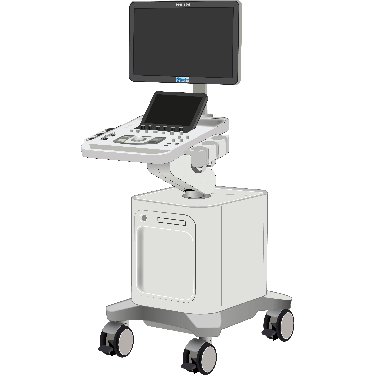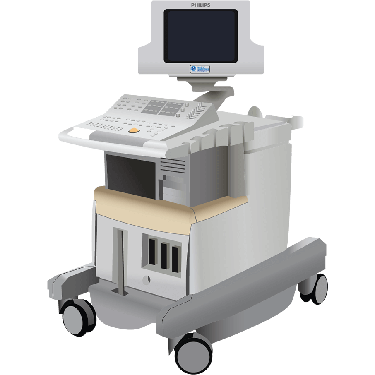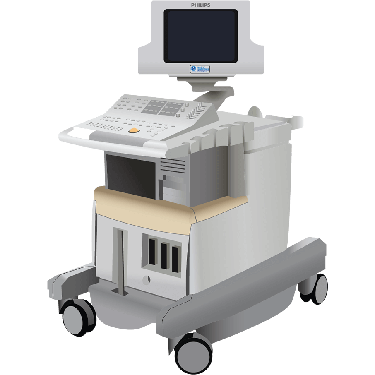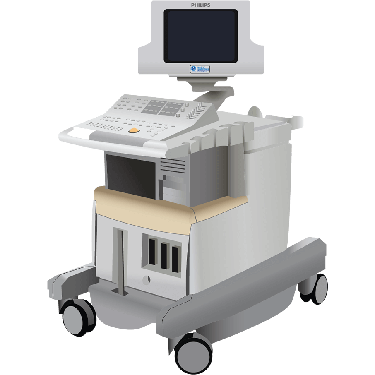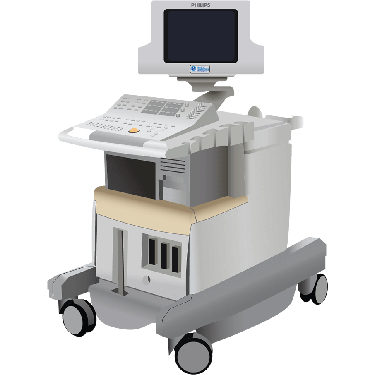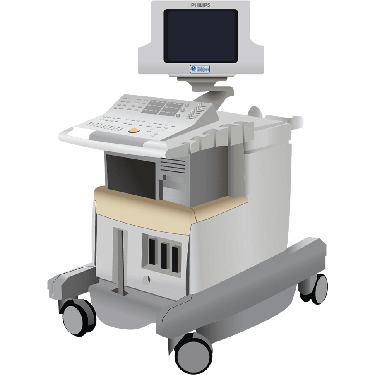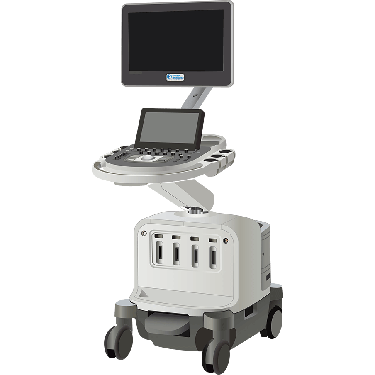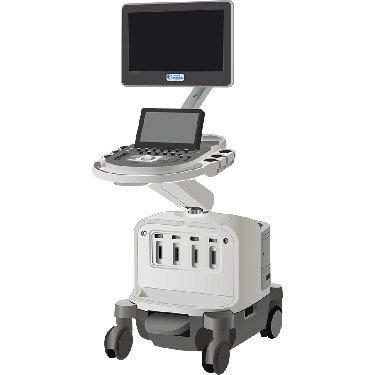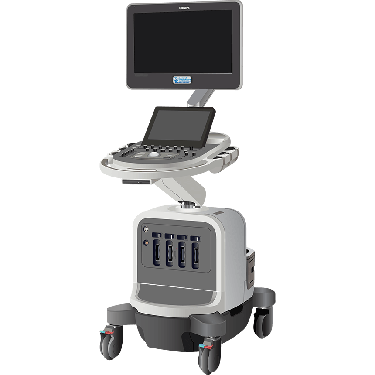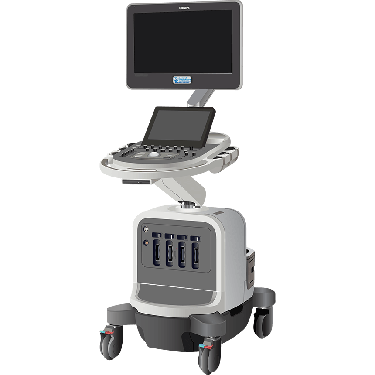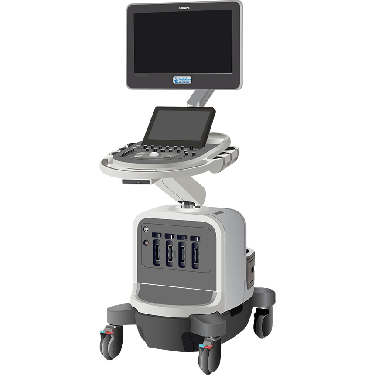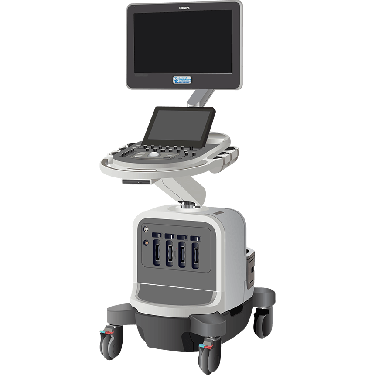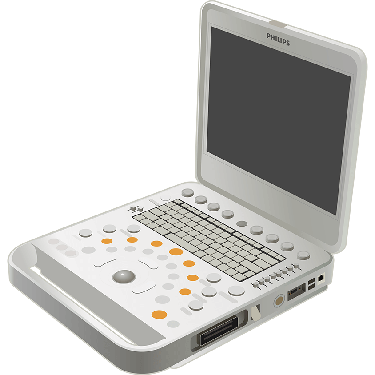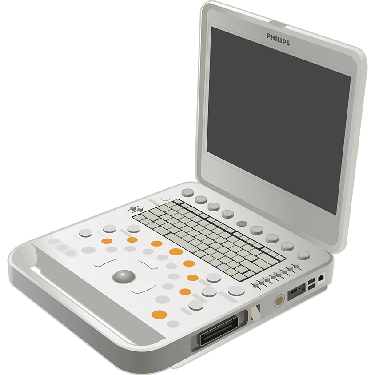Filters
Philips Ultrasound Products
Philips Ultrasound Machines
Philips ultrasound machines are at the core of Philips technology, a global health company known for its wide range of medical products, including ultrasound equipment.
Founded in the Netherlands in 1891, Philips has become one of the prominent leaders in healthcare technology, focusing on medical imaging systems, patient monitoring, and diagnostic tools.
Philips medical imaging devices cater to diverse clinical needs, ranging from ultra-mobile handheld devices to premium console ultrasound machines. These devices are used in various fields, including cardiology, obstetrics, and point-of-care applications.
Philips Ultrasound Machine Models
Philips ultrasound machines come in various types and models, each designed to meet specific medical needs. They can be used for general imaging, cardiovascular diagnostics, obstetrics, gynecology, and point-of-care conditions. Below is a brief overview of each of these medical applications:
General Imaging Ultrasound Machines
Philips ultrasound machines used in general imaging help healthcare providers examine organs, tissues, and blood vessels non-invasively, without ionizing radiation, unlike X-rays or CT scans. Below is a brief overview of three commonly used models for general imaging, such as Philips EPIQ Elite, Philips 5500 Series, and Affiniti CVx.
- Philips EPIQ Elite: A premium Philips ultrasound system combines advanced imaging technology with features like Anatomical Intelligence, AI-driven analysis, and real-time imaging enhancements. It is designed for various clinical applications, including cardiology and obstetrics. Philips EPIQ Elite model features XRES Pro processing, PureWave transducer technology, and automated scanning optimizations.
- Philips 5500 Series: The Philips 5500 series of ultrasound machines has a compact design, is compatible with PureWave transducers, and is commonly used in general imaging, point-of-care, and obstetrics and gynecology. In 2021, the Compact 5500 series earned both the iF Design Award and the Red Dot Product Design Award, praised for its outstanding mobility and innovative design.
- Affiniti CVx: Philips developed the Affiniti CVx, an innovative and AI-driven ultrasound machine specifically designed for echocardiography. This model offers advanced imaging capabilities that enhance diagnostic accuracy and streamline the workflow for cardiovascular assessments.
Cardiovascular Ultrasound Machines
In general, Philips cardiovascular ultrasound machines also support the latest AI-based technology and come equipped with 3D automated tricuspid valve assessment and color flow quantification tools. These features provide healthcare professionals with advanced technology to diagnose heart failure and coronary artery disease quickly and confidently. EPIQ CVx and EPIQ CVxi are two popular models used in echocardiography:
- EPIQ CVx: The Philips EPIQ CVx is a high-end cardiology ultrasound system that enhances echocardiography examination. It offers features like AutoStrain for automated ventricular assessment, Auto Segmental Wall Motion Scoring, and real-time 3D imaging.
- EPIQ CVxi: The EPIQ CVxi is a new Philips ultrasound machine model, providing enhanced guidance and support for various cardiovascular interventions.
- X11-4t Transducer: Above all, Philips also offers the xMatrix TEE Transducer, which is compatible with the two mentioned machines. This transducer features PureWave Crystal technology and supports an extended frequency range of 11 to 4 MHz. It enables imaging in multiple modes, including 2D, Live xPlane, Live 3D, 3D Zoom, Full Volume, and 3D color, providing versatile capabilities for various clinical applications.
Obstetrics and Gynecology Ultrasound Machines
Philips technology provides exceptional imaging for obstetrics and gynecology (OB/GYN) with powerful features. These features include Flow Viewer for 3D-like rendering, MicroFlow Imaging High Definition (MFI-HD) to detect low-volume and low-velocity blood flow, placental, and TrueVue Pro 3D.
There are different OB/GYN Philips ultrasound machines, from high-end to handheld devices, as follows:
5500 Series
Philips 550 Series, such as Philips SONOS 5500 Agilent, are highly mobile, cleanable, and easy-to-use devices. They are suitable for many different clinical environments in obstetrics and gynecology cases. Equipped with advanced PureWave transducers, they deliver reliable performance wherever needed. They are also used in general imaging, as mentioned earlier.
EPIQ Elite
EPIQ Elite devices feature technologies like Anatomical Intelligence and PureWave for enhanced diagnostics and support medical applications in general imaging, cardiology, and obstetrics.
Affiniti 70
The Philips Affiniti 70 offers high-quality imaging with features like AutoSCAN for optimizing images in real-time and PureWave technology for challenging cases in general imaging, obstetrics, and cardiology.
Affiniti 50
The Philips Affiniti 50 ultrasound system combines ergonomic design with precision engineering. It provides quick diagnostic information and advanced features to handle high patient volumes. Affiniti 50 includes Anatomical Intelligence for breast imaging, Flow Viewer for enhanced visualization of blood flow, and superior image quality to support obstetrics examination, along with other clinical applications.
Affiniti 30
The Philips Affiniti 30 is similar to the Affiniti 70 machines, featuring an ergonomic design and versatile clinical applications. While the Affiniti 30 offers a cost-effective solution, the Affiniti 70 provides higher-end functionalities, including advanced imaging modes and enhanced technologies for more challenging cases.
Lumify
The Philips Lumify ultrasound system is a portable, app-based device that connects to Android and iOS devices. It supports various clinical applications, including obstetrics, cardiology, and emergency care. Additionally, the Lumify machine offers features like pulsed wave Doppler, tissue harmonic imaging, and seamless data sharing for enhanced diagnostic workflows.
Point-of-Care Ultrasound Machines
Philips portable ultrasound systems offer a range of point-of-care imaging services with different devices. These include the 5500 Series, 5300 Series, InnoSight, Sparq, and Lumify, designed for various clinical environments. We discussed the features of the 5500 series and Lumify devices earlier, and below is a brief overview of the other devices.
- 5300 Series: The Philips 5300 ultrasound device is similar to the 5500, which we explained earlier. The main differences are the extra features in the 5500, like better mobility and advanced collaboration tools. Despite these distinctions, both models maintain the same core imaging capabilities and streamlined workflows.
- InnoSight: The Philips InnoSight is a compact and highly portable device with a user-friendly interface. It provides ultrasound imaging services in different environments, such as the office, clinic, or hospital.
- Sparq: The Philips Sparq machine supports point-of-care settings and provides easy-to-use and quick imaging in different medical cases.
Philips Ultrasound Machines Price
Philips ultrasound machine prices vary widely based on the model and features of each device.
The company offers a wide range of ultrasound systems, from advanced console ultrasound machines to top portable ultrasound devices. Philips' entry-level handheld devices may start around $5,000, while advanced systems used in cardiology or radiology can exceed $100,000.
Refurbished models are also available, which are much more cost-effective while maintaining the main features of Philips ultrasound systems.
Philips Ultrasound Machine History
The story of Philips' ultrasound machines and its medical equipment began in 1891 when the company was founded in the Netherlands.
- Philips initially produced lightbulbs, and by 1919, it entered the radio tube manufacturing market, marking its first significant step into the electronic industry.
- After the World War ended in 1945, the company ventured into the home consumer and media markets, producing household electronics, audio equipment, and entertainment devices.
- In the 1980s and 1990s, Philips began focusing on medical technology, including the acquisition of ATL Ultrasound, which helped establish its presence in ultrasound imaging.
Today, Philips continues to improve its medical devices, and Philips ultrasound systems play a crucial role in providing advanced imaging in the medical industry.
What Makes Philips Ultrasound Machines Unique?
As mentioned above, Philips technology provides high-quality imaging across various clinical applications. Key features of Philips ultrasound equipment include:
- Advanced Imaging Technology: Philips ultrasound systems provide advanced real-time imaging with high-resolution transducers and xMATRIX technology for multi-plane scanning.
- AI-Driven Technology: Philips ultrasound machines support AI tools and related technologies. This feature improves diagnostic accuracy, reduces scan times, and assists clinicians in making quicker and more informed examinations.
- Remote Collaboration: Collaboration Live feature in Philips devices like the 5500 series enables secure remote access for real-time clinical support.
- Portability and Flexibility: Compact systems like the Philips 5000 series and handheld Lumify provide healthcare providers with mobile diagnostic capabilities.
- User-Friendly Interface: The Design of Philips machines improves workflow efficiency and enhances the experience for healthcare providers and patients.
Key Innovations and Other Medical Solutions by Philips Company
Philips Healthcare is a leading medical company that offers a wide range of healthcare solutions beyond ultrasound machines. Here’s a brief overview of other key innovations from Philips:
- Patient Monitoring: Advanced systems for consistent monitoring in hospitals.
- Imaging Solutions: Technologies for MRI, CT scans, and X-rays.
- Sleep and Respiratory Care: Devices and therapies for sleep apnea and respiratory conditions.
- Interventional Imaging: Tools for image-guided therapies.
- Healthcare Informatics: Solutions for data management and clinical decision support.
Does a Philips Ultrasound Machine Come with a Warranty?
In ultrasound machines, problems such as software malfunctions, probe failures, or hardware defects can arise any time. These issues can potentially lead to costly repairs or downtime that disrupt patient care. A warranty option helps cover repair costs and ensures you get the support needed to keep the machine working properly.
However, not all suppliers offer warranty services. At Elzhen, you can purchase different types of Philips ultrasound machines, all with warranty coverage, and keep your machine running smoothly.
Get the Best Deals on Philips Ultrasound Machines at Elzhen
You can discover a full range of Philips ultrasound machines at Elzhen, all offered at competitive prices and backed by a reliable warranty. But that’s just the beginning. Elzhen also provides advanced tools and services to support your equipment, such as:.
- Elzhen 2200 Smart Transducer Analyzer: Test and evaluate the performance of your Philips transducer with ease.
- Probe Repair Service: In case of any issue with your transducer, rely on our expert repair team for fast and reliable service.
With Elzhen, you don’t just buy a machine, you gain access to a complete support system.
FAQs
How much does a Philips ultrasound machine cost?
Does Philips ultrasound equipment come with a warranty?
Are Philips Ultrasound Machines Manual?
What are the Philips portable ultrasound models?

